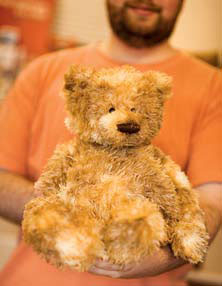
January 2005–December 2006
Many people lack access to companion animals or pet therapy. One alternative to the benefits that pets offer has been to use robots, such as Sony’s AIBO, as pet surrogates. Since these types of robotic platforms were never originally designed to be used in this way, they do not invite the same types of interactions experienced with an animal, such as petting and other forms of affective touch.
The Huggable is an interactive teddy bear, designed to be a new type of robotic companion for therapeutic applications. The primary design goals are:
- To be viscerally and emotionally pleasing to interact with, both with respect to how it feels to touch and how it responds to people.
- To provide measurable health benefits to people.
- To be a useful tool for the nursing staff or other care providers that augments existing animal assisted therapy programs (if present).
- To be a computationally flexible platform that allows us to explore other applications for the Huggable technology.
Given these goals, the Huggable is being developed with a number of technological features—the most significant of which is a full-body sensate skin consisting of three different types of somatic sensors (electric field, temperature, and force) over the entire surface of the robot. The sensate skin technology resides underneath a soft silicone skin and fur fabric covering to make the teddy bear pleasing to touch. Other sensors include an inertial measurement unit, cameras embedded in the eyes, and microphones in the ears. We have incorporated a new kind of voice coil actuator (with position sensing) to give the Huggable silent, compliant, and backlash-free movement in the neck, shoulders, and face. These actuators are driven by a custom-designed motor controller board. An embedded Windows PC with wireless communication capabilities is used to implement the Huggable’s behaviors, as well as provide the nursing staff with patient monitoring, and data collection capabilities.
Student Participants: Dan Stiehl, Jeff Lieberman
Faculty Advisor: Prof. Cynthia Breazeal
